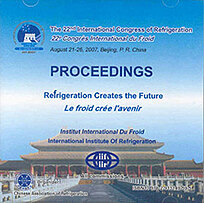
Document IIF
Atténuation des altérations dues au froid des cellules des tumeurs du cerveau in vitro utilisant des adjuvants nanoparticulaires.
Improved freezing injury of in vitro brain tumour cells by use of nanoparticle adjuvants.
Auteurs : DENG Z. S., ZHANG H., LIU J., et al.
Résumé
Along with the development of modern imaging techniques, cryosurgery is emerging as an important minimally invasive surgical method for treatment of brain tumours. Although imaging allows excellent control over the freezing extent, enhancement of cryosurgical injury of tumour cells at freezing temperature is also preferred to improve cryosurgical outcome. The goal of this study is to find effective cryosurgical adjuvants to enhance freezing injury of brain tumour cells. Considering the important role of ice crystal formation in freezing induced cell injury, nanoparticles were introduced in this study to produce more ice crystals and thus to enhance freezing injury of tumour cells. Cellular suspensions of brain tumour with and without nanoparticles were respectively frozen using a cryosurgical apparatus with two freeze-thaw cycles. The viability of brain tumour cells was then assessed by typan blue dye exclusion. The results indicate that nanoparticles significantly increase cellular destruction. It suggests that nanoparticles may be effective adjuvants to cryosurgical treatment of brain tumours.
Documents disponibles
Format PDF
Pages : ICR07-C1-1172
Disponible
Prix public
20 €
Prix membre*
Gratuit
* meilleur tarif applicable selon le type d'adhésion (voir le détail des avantages des adhésions individuelles et collectives)
Détails
- Titre original : Improved freezing injury of in vitro brain tumour cells by use of nanoparticle adjuvants.
- Identifiant de la fiche : 2008-0949
- Langues : Anglais
- Source : ICR 2007. Refrigeration Creates the Future. Proceedings of the 22nd IIR International Congress of Refrigeration.
- Date d'édition : 21/08/2007
Liens
Voir d'autres communications du même compte rendu (839)
Voir le compte rendu de la conférence
Indexation
- Thèmes : Cryomédecine et cryochirurgie
- Mots-clés : Cerveau; Tumeur; Particule; Maladie due au froid; Cryochirurgie; Congélation-décongélation; Additif
-
RESECTION OF 52 CASES BRAIN TUMOUR BY CRYOSURGI...
- Auteurs : LI J.
- Date : 11/10/1989
- Langues : Anglais
Voir la fiche
-
THE EXPERIENCE OF REMOVING 7 HUGE MENINGIOMAS B...
- Auteurs : GAN H., TAO X.
- Date : 11/10/1989
- Langues : Anglais
Voir la fiche
-
CRYOPROBES FOR MEDICAL SURGERY. A NEW BLOOD-LES...
- Auteurs : JAIN A. P., SAXENA R. B., BABBAR N. K.
- Date : 20/05/1985
- Langues : Anglais
- Source : Fundamentals and Applications of Freeze-Drying to Biological Materials, Drugs and Foodstuffs.
- Formats : PDF
Voir la fiche
-
CRYOSURGERY OF JAW TUMOURS AND ULTRASTRUCTURAL ...
- Auteurs : WANG N.
- Date : 07/08/1983
- Langues : Anglais
- Source : [Refrigeration serving humanity]. Proceedings of the XVIth international Congress of Refrigeration.
- Formats : PDF
Voir la fiche
-
PROGRESS IN CRYOSURGERY.
- Auteurs : ABLIN R. J.
- Date : 07/08/1983
- Langues : Anglais
- Source : [Refrigeration serving humanity]. Proceedings of the XVIth international Congress of Refrigeration.
- Formats : PDF
Voir la fiche
